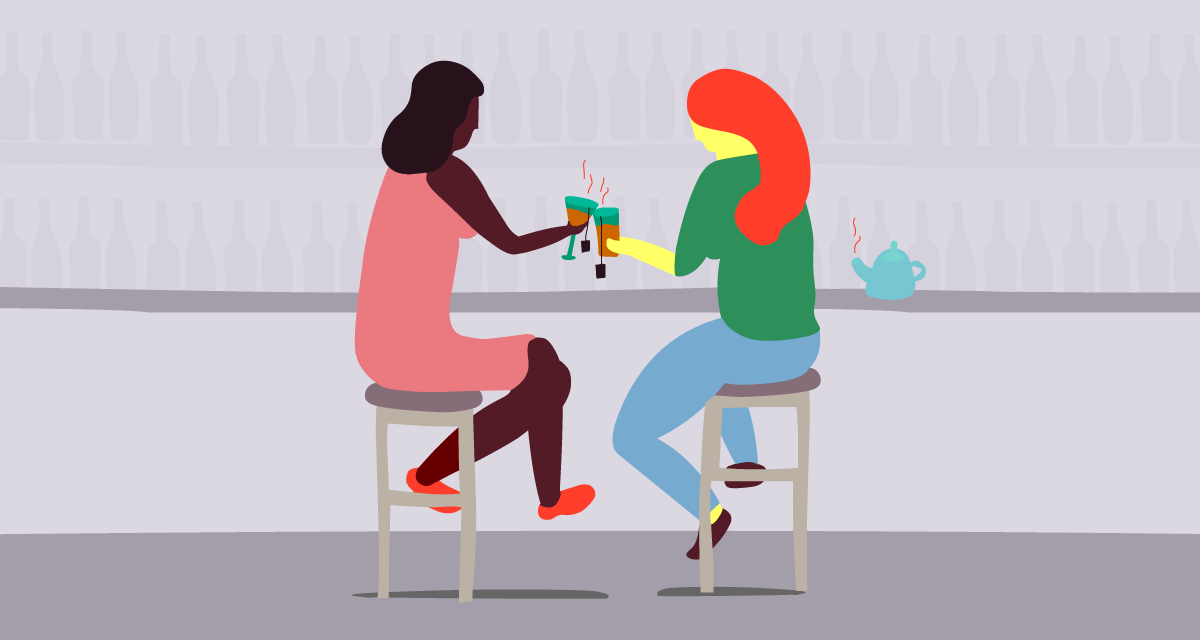Limit alcoholic beverages to fewer than 3 per week.
How many times a week do you have a drink? If it is more than 3, listen up. Alcohol consumption increases the risk of breast cancer in women.
Women and Alcohol
In all known societies where alcohol is consumed, men drink more than women. Because of this, men have been much more likely than women to experience alcohol problems. However, in recent decades, the gap between men and women has narrowed in relation to both consumption and problems.
The Institute of Alcohol Studies in the UK states that there has been a levelling off in female alcohol consumption in recent years. However, alcohol use is particularly high in teenagers, where in some areas teenage girls are as likely as teenage boys to binge drink. This trend is a great cause for concern since drinking alcohol is one of the known risk factors for breast cancer along with inactivity, oral contraceptives, hormone replacement therapy, a family history of breast cancer, late or no child-bearing, insufficient vitamin D and chronic exposure to pesticides, PCBs, fire-retardants and certain plastics.
Alcohol and Breast Cancer
Even light to moderate alcohol consumption, such as a weekly intake of up to one drink a day, increases breast cancer risk. Women who have one drink a day have an 11% higher risk of breast cancer. In one study the breast cancer risk increase was 250 percent for women who drank two or more drinks daily. It’s best to avoid alcohol, reserving it for special occasions a few times annually, or at least reduce alcohol consumption to no more than 3 alcoholic beverages per week.
How does alcohol increase the risk of cancer?
Researchers have identified multiple ways that alcohol may increase the risk of cancer, including:
- When the body breaks down the ethanol in alcoholic drinks it creates acetaldehyde, which is a toxic chemical and a probable human carcinogen; acetaldehyde can damage both DNA (the genetic material that makes up genes) and proteins.
- Generating reactive oxygen species (chemically reactive molecules that contain oxygen), which can damage DNA, proteins, and lipids (fats) through a process called oxidation.
- Impairing the body’s ability to break down and absorb a variety of nutrients that may be associated with cancer risk, including vitamin A; nutrients in the vitamin B complex, such as folate; vitamin C; vitamin D; vitamin E; and carotenoids
- Increasing blood levels of estrogen, a sex hormone linked to the risk of breast cancer
- Affecting the liver’s ability to metabolize environmental chemicals – thus elevating our body burden
- Increasing blood sugar and insulin levels, which make us more susceptible to breast cancer
- Alcoholic drinks often contain carcinogens introduced during fermentation and production, such as nitrosamines, asbestos fibers, phenols and hydrocarbons
What Do I Use Instead?
Often we crave alcohol when we need to relax, unwind or release inhibitions. The next time you are out with friends or reaching for alcohol, try one of the following substitutes: 1) a wedge of lemon or lime with sparkling water; 2) a small amount of grape juice with sparkling water; 3) chamomile or Holy Basil tea, which both will help you to relax and also inhibit breast cancer; 4) settle yourself in a comfortable position and practice concentrated long deep breathing through your left nostril (block the right with your index finger) for about 11 minutes.
Consider an alternative social activity that will help you to relax, such as team sports, a yoga class, board games, dance or playing music.
References:
http://www.ias.org.uk/Alcohol-knowledge-centre/Alcohol-and-women.aspx
https://www.cancer.gov/about-cancer/causes-prevention/risk/alcohol/alcohol-fact-sheet#q3
Allen NE, Beral V, Casabonne D et al. Moderate alcohol intake and cancer incidence in women. J Natl Cancer Inst 2009;101(5):296-305.
Laffoy M, McCarthy T, Mullen L, et al. Cancer incidence and mortality due to alcohol: an analysis of 10-year data. Ir Med J. 2013 Nov-Dec;106(10):294-7.
Testino G, Leone S, Patussi V, Scafato E. Alcohol, cardiovascular prevention and cancer. Recent Prog Med. 2014 Apr;105(4):144-6.
Park SY, Kolonel LN, Lim U et al. Alcohol consumption and breast cancer risk among women from five ethnic groups with light to moderate intakes: the Multiethnic Cohort Study. Int J Cancer. 2014 Mar15;134(6):1504-10.
Scoccianti C, Straif K, Romieu I. Recent evidence on alcohol and cancer epidemiology. Future Oncol. 2013 Sep;9(9):1315-22.
Vachon CM, Kuni CC, Anderson K et al. Association of mammographically defined percent breast density with epidemiologic risk factors for breast cancer (United States). Cancer Causes Control. 2000 Aug;11(7):653-62.
Dumitrescu RG, Shields PG Review The etiology of alcohol-induced breast cancer. Alcohol. 2005 Apr; 35(3):213-25.
Take the Breast Health Challenge!
Replace alcohol with alternative healthy beverages and take a photo or make a video of you doing it, and post on your Facebook page, Youtube or Instagram with the hashtag #breasthealthchallenge between Oct 1-31. Challenge your friends to do the same.
Sign up to receive daily tips in October: Sign Up
Tell us about how you gave up alcohol in the comments section below. Let’s share what works!
Click here to see all tips
Upcoming Programs
For upcoming Healthy Breast Programs see http://mammalive.net/upcoming-courses/




